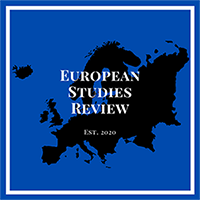By Jelle Baartmans
On December 24, 2020, Maia Sandu was inaugurated as President of the Republic of Moldova. The challenges she was going to face were unknown to most Europeans. Moldova is one of the poorest countries in Europe (its GDP per capita is half of Bulgaria’s), has suffered from large-scale corruption, does not have full control over its own territory and, last but not least, has been subject to geopolitical power play between Russia and the West. How has Sandu fared so far?
A Turn Westward
Maia Sandu is the most pro-Western president Moldova has ever elected. She replaced Igor Dodon, whose political strategy was more oriented towards Russia. A comparison of both presidents’ first trips abroad sheds some light on their geopolitical orientations. Dodon’s first ten foreign trips were to Moscow, Brussels, Tehran, Moscow, Bishkek, Moscow, Istanbul, Budapest, Saint Petersburg, and Baku. Sandu, meanwhile, visited Kyiv, Brussels, Paris, Strasbourg, Bucharest, Berlin, Rome, Warsaw, Batumi, and Kyiv. Recently, Sandu explicitly expressed her desire for Moldova to join the European Union at some point.
As a parliamentary republic, the actions of the Moldovan president are limited without support from the parliament. Conveniently for Sandu, her own Party of Action and Solidarity (PAS) achieved a landslide victory (63 of 101 seats) in Moldova’s parliamentary elections in July 2021. This was a clear sign that the Moldovan electorate liked what they had seen so far from their new president. Sandu appointed Natalia Gavrilița as prime minister in Moldova’s new government. Considering that both women are Harvard alumni, it is evident to expect a new Western-oriented strategy in the country.
The Fight against Corruption
From day one of her presidential campaign, Sandu has prioritized the fight against corruption, because she believes it is the main source of Moldova’s problems. As she told the Balkan Investigative Reporting Network in the run-up to the presidential elections last year: “Corruption suffocates the economy, dries up the public budget and deprives people of the prospect of a good life at home.” In Transparency International’s 2020 Corruption Perception Index, Moldova ranked 115th out of 179 countries. After PAS’s victory in the parliamentary elections, Sandu said she hoped it “will be an end to the rule of thieves over Moldova.”
In June, President Sandu launched the Moldovan Anticorruption Independent Consultative Committee, which is tasked with the investigation of large-scale corruption in the financial sector. It is co-financed by the EU and the United States. Participants to the Committee include authoritative members, such as U.S. diplomat James Wasserstrom—who has a long history of fighting corruption in Kosovo, Afghanistan and Ukraine—and Moldovan investigative journalist Alina Radu.
An important blow to the corrupt system was the detention of Prosecutor General Alexandru Stoianoglo in October on charges of corruption. Stoianoglo had been appointed by President Dodon and, to the eyes of the public opinion, has a questionable reputation. In January he ordered the detention of Viorel Morari, a reputable anti-corruption prosecutor who claimed he was investigating links between Stoianoglo and Veaceslav Platon, a controversial Moldovan businessman who was sentenced to 18 years in prison in 2017 for money laundering. Stoianoglo later appealed Platon’s conviction, who was ultimately acquitted in June of this year and then fled the country. After Stoianoglo’s detention, President Sandu appointed former anti-corruption prosecutor Dumitru Robu as acting Prosecutor General.
Dealing with Russia
Arguably Maia Sandu’s biggest challenge was dealing with Russia in the recent natural gas dispute. After Moldova’s existing natural gas contract with Gazprom ended in September, Gazprom demanded a significantly higher (spot) price for the continuation of deliveries and ordered Moldova to pay its natural gas debt of over $700 million—a debt that Moldova disputes. Moldova was not intent on paying the spot price of $790 per million cubic meters (mcm), over three times the price under the previous contract. In response, Russia—on which Moldova is 100% dependent for natural gas—reduced supplies, leading to a state of emergency in the country.
Amid this energy crisis, Sandu did not succumb to the pressure. As EU–Russia relations analyst Stanislav Secrieru argues in a Carnegie Moscow op-ed, despite its weak position Moldova did not immediately give in to Moscow’s intimidation tactics. Sandu swiftly struck deals with Romania, Ukraine and Poland to deliver much-needed supplies on the short term. Meanwhile, she garnered support from the EU, which provided €60 million “to reduce the impact of rising gas prices on the most vulnerable people in Moldova.” Ultimately, this resulted in a new five-year contract with Gazprom based on acceptable prices for Moldova ($450/mcm in November) and a postponement of debt payments.
More challenges to come
Assessing Maia Sandu’s first year as President of Moldova is not an easy task. Anti-corruption reforms take time to bear fruit and other challenges lay ahead. The desire to one day join the EU cannot be separated from the issue of Transnistria, the breakaway region in the east of Moldova, over which the country has no governmental control. Any breakthrough on the issue is impossible without the cooperation of Russia, which finances the separatists and whose armed forces are still present in the region. Evguenia Roussel referred to the Transnistrian question as a catch-22 situation: integration with the West is only possible with a solution to the conflict, but the conflict can only be solved with concessions to Transnistria and Russia.
Nevertheless, for those observers who held reasonable expectations, the first year of Sandu’s presidency does not display disappointments. Sandu has a clear mandate for the years to come. The president and government have not been involved in political scandals and after PAS’s victory in last year’s parliamentary elections and the conclusion of a new natural gas contract with Gazprom, Moldova appears to have entered calmer waters for the first time in many years. The central question remains: how long will it last?

